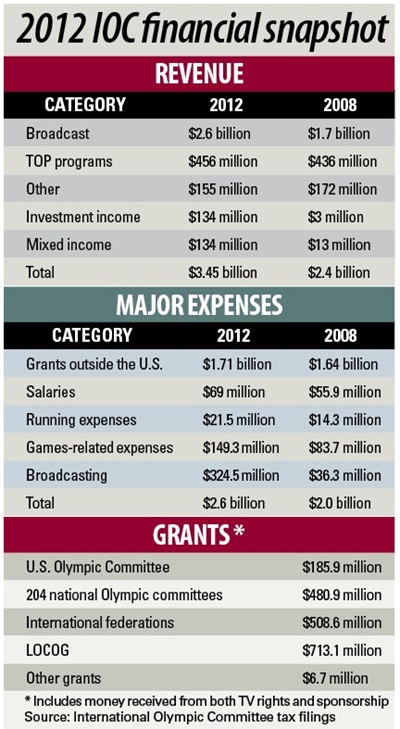The London Games were the most lucrative in the International Olympic Committee’s history, delivering $900 million more in broadcast rights fees worldwide than the organization received during the 2008 Beijing Games.
 |
The Summer Games typically provide more than 60 percent of the IOC’s quadrennial revenue.
Photo by: GETTY IMAGES
|
The $2.6 billion in rights fees broadcasters paid the organization combined with more than $456 million in marketing income, $134 million in investment income and $134 million in mixed income to push the IOC’s total revenue in 2012 to more than $3.4 billion, according to tax documents filed last month. The total revenue is $1 billion more than the organization reported collecting during the 2008 Beijing Games, a 44 percent increase.
The organization spent $2.6 billion last year. Approximately $1.9 billion of that was in the form of grants to the U.S. Olympic Committee, 204 other national Olympic committees, international federations and the London Organizing Committee of the Olympic Games (LOCOG). The total spent on grants was $120 million more than the IOC spent in 2008, a 7 percent increase.
The IOC operates on a quadrennial budget, which reflects earnings from the most recent Winter and Summer Games. It won’t report its full financial results until the 125th IOC Session in Buenos Aires, Argentina, next month.
The Summer Olympics typically provide more than 60 percent of the IOC’s quadrennial revenue because broadcasters pay more for rights to show a Summer Games. For example, NBC paid $1.2 billion for the 2012 London Games, $400 million more than it paid for the 2010 Vancouver Games.
Tax filings show that the organization earned a total of $5.37 billion in revenue between 2009-12. It collected $1.7 billion in 2010 when it held the Vancouver Games and $3.4 billion in 2012 when it held the London Games. The organization earned just $158 million and $153 million in revenue in 2009 and 2011, respectively.
The organization brought in a total of $3.7 billion in revenue for the period between 2005-08, according to tax filings for those years.
Media rights payments delivered the bulk of the IOC’s revenue increase between the 2008 and 2012 Summer Games. The organization collected $1.18 billion from NBC for the London Games, $285 million more than it did for the Beijing Games. It also collected $1.3 billion from non-U.S. broadcasters, $535 million more than international rights holders paid in 2008.
Though TV rights revenue soared over those four years, marketing revenue remained flat. The IOC collected $456 million from sponsors of The Olympic Partner (TOP) program in 2008, up just $20 million from what it collected in 2008.
The IOC also reported $134 million in investment income. It didn’t detail its investments, but the Dow Jones Industrial Average rose more than 11 percent in 2012.
The IOC reported $2.6 billion in expenses in 2012. More than $1.7 billion of that was paid through grants. It paid the USOC $150.6 million from broadcast royalties and $35.4 million from the TOP program. It gave 204 other national Olympic committees $405 million in broadcast royalties and $75 million from the TOP program to share. International federations and LOCOG shared $1.5 billion in broadcasting revenue.
The discrepancy between what the USOC receives from the IOC and what other nations and federations share used to be a flashpoint in the Olympic industry. But the USOC and IOC last year agreed to rework their agreement, which had given the USOC 12.75 percent of broadcasting and 16 percent of TOP revenue. Under terms of the new agreement, the USOC’s total haul is capped at $410 million per quadrennium plus a share of revenue from new growth areas. It receives more than other Olympic committees because NBC pays more for U.S. broadcast rights than any other rights holder pays worldwide.
The IOC’s total expenses in 2008 when it held the Beijing Games was $2 billion.
The IOC’s $1 billion increase in revenue between the 2008 and 2012 Summer Games was unprecedented, and it’s unlikely the organization will be able to repeat it in 2016. The organization pulled in a total of $3.9 billion in rights fees for the 2009-12 quadrennial, a 50 percent increase from the 2005-2008 period. To date, it has booked only slightly more than $4 billion for the 2013-16 period.
But the organization’s revenue growth over the last eight years allowed it to increase its total assets to $2 billion and meet outgoing IOC President Jacques Rogge’s goal of having enough cash on hand to support the IOC and repay debts should an Olympics be canceled because of political instability, war or any other unexpected event.





